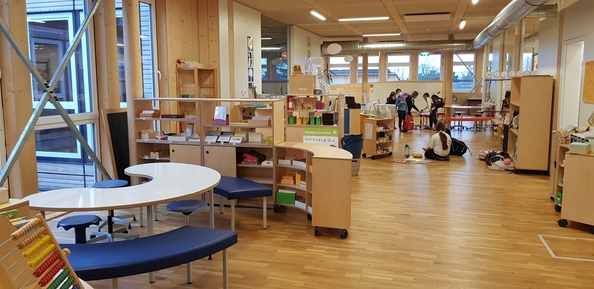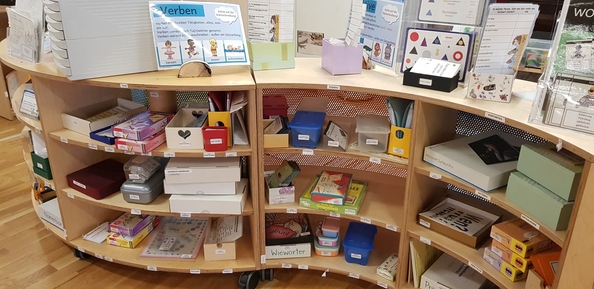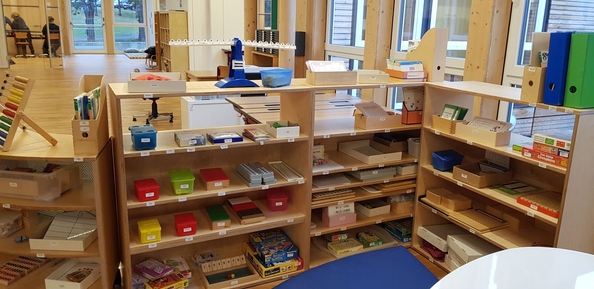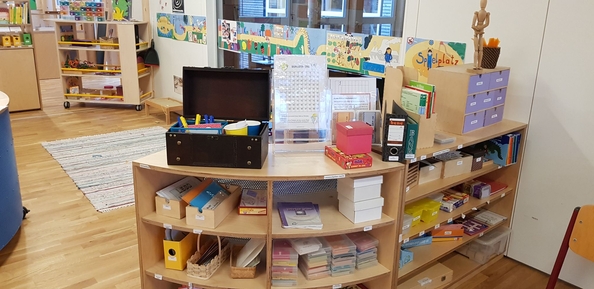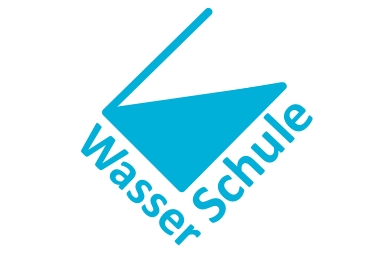The Mayflower Christian Academy (MCA) is a continuation of the private kindergarten Arche Noah and builds on its concept, values and focus. As a denominational public school of the "Free Churches in Austria", our pedagogy is shaped by a biblical view of man and the world.
We see school as an important common learning and living space. Our relationships are both the basis and the goal of our daily interaction. Parents are valuable and valued partners and are involved in the shaping and development of the school where desired. We place great emphasis on communication because we believe that for the successful development of the child, parents and teaching team must work together in unity and pull in the same direction.
Organisation
The primary aim of MCA Primary is to educate pupils and students from Grade 0 to Grade 4, according to the Austrian primary school curriculum. The subject matter is partly taught in English. The principles for teaching and education correspond to the school regulations of the "Free Churches in Austria". Lessons, project work, leisure activities and learning times take place in interleaved form in the morning and afternoon.
Language-sensitive teaching and foreign languages
At MCA, GERMAN is used as the first language of instruction. ENGLISH is used intensively as a second language.
The children at MCA come from many countries and have many different first languages. Language-sensitive teaching is therefore a special concern for us. All teachers strive for a conscious and clear use of German as well as English in their lessons. In addition, specially trained teachers for DaZ/DaF (German as a Second and Foreign Language) support our pupils to overcome linguistic hurdles in German and to achieve learning goals in all subjects more easily. Language competence in English is intensively and rapidly built up and expanded by means of English lessons and the inclusion of the English language in many subjects.
Children with insufficient German language skills (determined by MIKA-D testing) start the school year as exceptional pupils. They receive intensive support in German in order to be able to follow lessons as quickly as possible. The MIKA-D test is repeated at regular intervals until the pupils meet the requirements to be listed as regular pupils. Language-sensitive teaching and intensive support in German and English improve the educational opportunities of all pupils, regardless of their first language, and enable a good, successful transition to secondary German- or English-speaking schools.
Teaching in multi-grade classes, MSK
At MCA, children from several school levels (up to 4 or 5 pre-school levels) are taught together in one class.
In the course of the four school years, each child experiences different phases, which result from the age-specific position within the class group. This form of class mixing is primarily intended to promote a child's social competence. The child matures from a "small, new" classmate to a "big, experienced" schoolchild. Older children take on social responsibility for younger ones and younger ones later become older "buddies" themselves. Older pupils have the opportunity to play childishly in the leisure phases, younger ones often pick up knowledge input in advance. High-performing children can occasionally work with the next higher learning year, while lower-performing children can consolidate basics with the previous learning year.
Read more?
Since the beginning, MCA has been teaching across all grades. Initially, the classes were divided into GS I (0 - 2nd grade) and GS II (3rd and 4th grade). Today, we also have "classic" multi-grade classes for pupils in grades 0-4. The flexible school entry phase (i.e. integrative management of the pre-school stage /0th school stage in the class group of the MSK) is a fixed component of the concept. The Arche Noah kindergarten, which is located on the same campus, is also run with an open pedagogical concept. Many of the children attend the 1st grade of the MCA after the Arche Noah kindergarten. They are already familiar with free learning and bring with them the readiness and basic skills to work independently and with partners or in small groups.
At the beginning of the school year, depending on the number of classes available and the distribution of pupils by grade, 4 - 8 first graders and first-year pupils are newly admitted to the class group of the multi-grade class. There they work on the learning objectives adapted to them. The lessons take place partly in class, partly in small learning and support groups or also individually adapted to the different needs of the children. Children in the fourth grade are prepared to attend a secondary general school (MS or AHS). More and more pupils transfer to the MCA Secondary I (curriculum lower secondary school) at the same campus location.
Teaching in MSK enables all children to have social experiences like children can have with their siblings in the family circle. This can be very enriching, especially for individual children. In class, there is a conducive exchange between children of different years and there is a more natural social climate. Older pupils pass on learning skills, work techniques, tips on time management and concentrated work, etc. to the younger ones in a natural way.
The classroom as well as the marketplace in the corridor are available for teaching in the multi-grade class. The pupils and students work both in class at their regular place and, by arrangement, at the marketplace (various group tables, learning carpets, ...).
All materials for German and mathematics lessons are located at the marketplace. The learning materials are stored in a structured way:
- German: spelling, language observation, story workshop, first reading tasks, ...
- Mathematics: number ranges, 1x1 shelf, geometry, units of measurement, ...
The materials are freely accessible to the children and many of them allow for "self-monitoring" .
When setting up the marketplace, care was taken to ensure that the environment was
- adapted to the needs of the children and
- clearly structured and manageable and
- and encourages "creative activity".
Activities with the various teaching materials should not only promote cognitive performance, but also satisfy the senses and the "psychological balance" of a child and enable holistic learning.
The role of teachers
Their main task is to
- to impart knowledge to the children
- to support them in their independent work
- to give impulses,
- to help with problems and
- to ensure that the jointly agreed rules are adhered to (volume during work, order, completion of work, correction work, etc.).
Our teachers often remain in the background observing and step in when asked. The teachers see themselves as learning guides who help the children to become more and more independent. This also means that the pupils learn: I am responsible for what I do.
The daily routine in class
We start the day together. First, organisational things are taken care of and the daily routine is discussed.
Then the free work begins in the groups - sometimes independently according to a plan, sometimes together with a teacher to introduce a topic. After a short time, all children are active and there is a calm working atmosphere. We regard textbooks as a guide that provides an overview of the learning objectives of a school level. They are supplemented, loosened up or completely replaced by free-work material in the classroom. Work is done together with children from the same year of learning (e.g. introduction of the 2 series with the 2nd year of learning) or with several years of learning (e.g. introduction of the text type letter with the 2nd, 3rd and 4th year of learning). Depending on the task, the children work alone, in partner work or in small groups.
The end of this free work time is announced by a signal. The children tidy up and gather in the classroom. Afterwards, there is a reflection round, a writers' round, joint silence exercises or a class council. In the reflection round, children report what they have learned in the work phases and explain it in such a way that others can also understand it well. In the authors' round, self-written stories are recited.
This is followed by items such as music, art, PE, English, religion or subject matter. These items can also be made more teacher-centred.
Making transitions easier and interesting
One of MCA's special concerns is to make the transition from kindergarten to school or from grade 4 to grade 5 as natural as possible and to accompany our pupils intensively through these phases.
In order to achieve this transition work in an ideal way, the following focal points are set:
- Joint projects between Kindergarten Arche Noah and grades 0 and 1, such as reading projects, station days, excursions, art and music projects.
- Joint project-oriented lessons in the 4th and 5th grade, e.g. literature or maths projects, English and science projects,...
- Joint preparation and planning times for the respective teams of teachers
offenen
Tür
